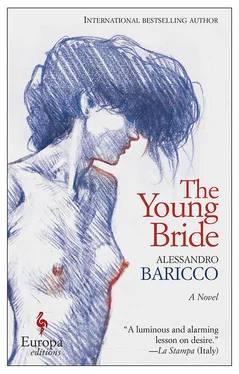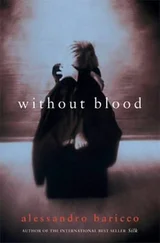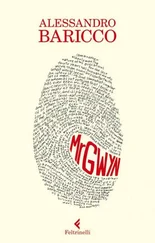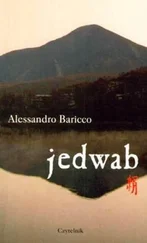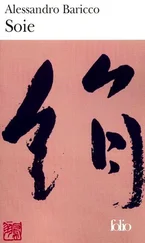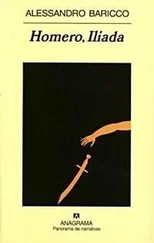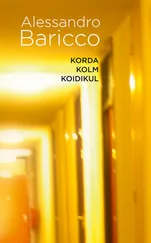I know, said the Father.
Trust me.
That isn’t the problem.
What is it, then?
I’m not used to trusting in the efficacy of the irrational.
I beg your pardon?
You want to stay here because you feel that the Son will arrive, right?
Yes.
I’m not used to making decisions on the basis of what one feels .
Maybe I didn’t choose the right word.
Choose a better one.
I know it. I know that he’ll return.
On the basis of what?
You think you know the Son?
The little that we’re allowed to know our children. They are submerged continents, we see merely what is on the surface of the water.
But for me he’s not a son, he’s the man I love. Can you admit that I might know something more about him? I don’t say feel , I say know .
It’s possible.
Isn’t that enough?
Like a flash, the suspicion that, if he just allowed that girl to truly wait for him, the Son would come back, returned to the Father.
He closed his eyes, and, resting his elbows on the desk, brought the palms of his hands to his face. He ran his fingertips over the wrinkles on his forehead. He remained like that for a long time. The young Bride said nothing: she waited. She was wondering what she could add, to bend that man’s will. For a second she thought of talking to him about Don Quixote , but immediately realized that it would only complicate things. There was nothing else she could say, and now the only thing to do was wait.
The Father took his hands away from his face and settled himself placidly in the chair, leaning against the back.
As they certainly must have told you that day, in the city, he said, for years I’ve been grappling with a task that I chose and that, over time, I’ve learned to love. I’m striving to put the world in order, so to speak. I don’t mean the entire world, obviously, I mean that small portion of the world that has been assigned to me.
He spoke with great tranquility, but searching for the words, one by one.
It’s not an easy task, he said.
He took a letter opener from the desk, and began to twirl it in his fingers.
Lately I’ve been convinced that I will be able to complete this task only by making a gesture most of whose details will, unfortunately, not be under my control.
He looked up at the young Bride.
It’s a gesture that has to do with dying, he said.
The young Bride didn’t move a muscle.
So I often ask myself if I will be up to it, the Father continued. I have to keep in mind the fact that, for reasons I wouldn’t know how to give a convincing explanation for, I find myself confronting this, like other tests, in complete solitude, or at least without the safe presence of some suitable person near me. It’s a thing that can happen.
The young Bride nodded assent.
For this reason I’m wondering if it would not be too audacious, on my part, to go so far as to ask you a favor.
The young Bride raised her chin very slightly, without changing her gaze.
The Father put the letter opener on the table.
That day, when I find myself confronted by the need to make that gesture, would you be so kind as to be with me?
He said it coldly, as he might have pronounced the price of a fabric.
It’s also possible, he added, that when that day arrives you won’t be in this house, and in fact it’s reasonable to think that I will have long since become accustomed to not to hearing about you. Yet I will know how to find you, and will send for you. I won’t ask you anything in particular, it will be sufficient to have you near and to talk to you, to hear you speak. I know that I’ll be in a hurry or have too much time ahead, on that day: will you promise to help me spend those hours, or those minutes, in the right way?
The young Bride laughed.
You’re proposing a trade, she said.
Yes.
You’ll leave me alone, in this house, if I promise to come to you, that day.
Exactly.
The young Bride laughed again, then she thought of something and became serious again.
Why me? she asked.
I don’t know. But I feel it’s right that way.
Then the young Bride shook her head, amused, and recalled that no one shuffles the cards better than a cardsharp.
All right, she said.
The Father made a slight bow.
All right, the young Bride repeated.
Yes, said the Father.
Then he got up, walked around the desk, went to the door, and before opening it turned.
Modesto won’t appreciate it, he said.
He can stay, too, I’m sure he’d be happy to.
No, that’s out of the question. If you want to stay, you’ll stay alone.
All right.
Do you have a vague idea of what you’ll do in all that time?
Of course. I’ll wait for the Son.
Obviously, I’m sorry.
He stood there, without really knowing why. He had placed his hand on the doorknob, but he was still standing there.
Don’t be afraid, he’ll come back, said the young Bride.
By tradition they left in two honking cars. Nothing especially elegant, but the solemnity of the occasion required a certain display of grandeur. Habitually, Modesto said goodbye standing on the threshold of the entrance, even though he was ready to leave himself, his suitcase placed on the ground next to him: like any captain, he considered it his duty to be the last to abandon ship. That year, he found beside him the young Bride, and this because of the variation that the Father had announced concisely, at one of the last breakfasts, and that he had greeted without enthusiasm. The fact that it seemed to be the prelude to the return of the Son had helped him endure his irritation at the news.
So they stood on the threshold, stiffly, he and the young Bride, when the two cars set off, pistons sputtering, hands waving, and various cries. They were two fine automobiles, cream-colored. They went ten meters and stopped. They shifted into reverse and in a rather elaborate way backed up. The Mother jumped out with surprising agility and ran to the house. As she passed Modesto and the young Bride she hurriedly murmured three words.
I forgot something.
Then she disappeared into the house. She came out a few minutes later and, without even saying goodbye, ran to the cars and got in. She appeared visibly relieved.
So the cars set off again, sputtering as they had the first time, and even more animated by final waves and cheerful voices. They went ten meters and stopped. They had to shift into reverse again. This time the Mother got out with a hint of anxiety. She covered with decisive steps the distance that divided her from the entrance and disappeared into the house murmuring four words.
I forgot something else.
The young Bride turned toward Modesto, giving him a questioning gaze.
Modesto cleared his throat with two precise contractions of the larynx, one short, the other long. The young Bride’s education in that cuneiform writing wasn’t so advanced, but she sensed vaguely that it was all under control, and was calm.
The Mother got back in the car, the engines revved again, and in a bubble of noisy joy goodbyes were said conclusively and without regret. This time, before stopping, they traveled some meters farther. They shifted into reverse with a certain fluidity, since they had learned how.
The Mother returned to the house humming, with the most complete self-control. She seemed to know what she wanted. When she reached the doorway, however, right next to Modesto and the young Bride, she was seized by some second thoughts. She stopped. She seemed to be focusing on some belated reflection. She shrugged and said three words.
But no, O.K.
Then she turned around and went back to the cars, still humming.
Читать дальше
